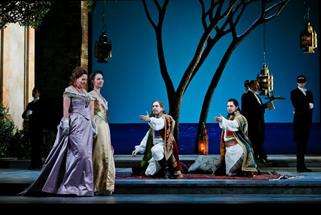|
Back
Bittersweet Melbourne
State Theatre
05/14/2019 - & May 18, 21, 23, 25, 2019
Wolfgang Amadeus Mozart: Così fan tutte, K. 588
Jane Ede (Fiordiligi), Anna Dowsley (Dorabella), Taryn Fiebig (Despina), Pavel Petrov (Ferrando), Samuel Dundas (Guglielmo), Richard Anderson (Don Alfonso)
Opera Australia Chorus, Anthony Hunt (Chorus Master & Fortepiano), Orchestra Victoria, Keri-Lynn Wilson (Conductor)
Sir David McVicar (Director), Andy Morton (Revival Director), Moritz Junge (Set & Costume Designer), David Finn (Lighting Designer)

J. Ede, A. Dowsley, S. Dundas, P. Petrov (© Jeff Busby)
Melbourne opera audiences have waited expectantly for this final instalment of the trilogy of Mozart/Da Ponte operas directed by stellar UK Director Sir David McVicar. His darkly Gothic Don Giovanni (2014) and sumptuously elegant The Marriage of Figaro (2015) are joined by this resplendently sun-drenched Neapolitan delight. As refined and complex as the previous operas, this production brings the audience into the faded glory of an age of “innocence and elegance” according to Sir David and places the action in a Europe on the verge of tearing itself apart with World War 1. Yet, there is no hint of what is to come; everything is as gentle, or to quote Despina: “foolish” as it has always been and the look and style of the show reflects a reverence for the days of the “Grand Tour”, the exoticism of the passing parade of characters and balmy late-summer afternoons along the Bay of Naples.
Like the two earlier operas, this has been created with a highly refined eye for detail. Every element of the stage action is natural with the characters acting upon their words with gestures and timing entirely appropriate to the tempi of the music and the libretto. Each set reflects in every facet, the mood and tone of the action and is accentuated by David Finn’s glorious lighting design which bathes the whole in the summer warmth of southern Italy. The setting moves from a polished gentleman’s club to the sisters’ house, to the garden of a villa; all dominated by a shell of gold-capital pilastered walls, slightly worn and grubby; faded window shutters, slightly broken and unpainted and raw brickwork, slightly decaying and rough but all capturing views of the sparkling sea beyond. From the settings alone, this is the end of an era of unworldliness and grace.
The costumes by Moritz Junge are as elegant as his sets. Prussian officers’ uniforms, a team of smart manservants to move props and furniture and to fill Cognac glasses give way to flowing white and gold Eastern robes reflecting the assumed Albanian nationality of the two disguised lovers. Ankle-length cotton day dresses cover ruffled and suspendered undergarments and are replaced with pastel silk evening gowns in dressing room scenes which occur with some frequency as we visit the girls in their private apartments.
Musically, this production is superb. The show marks important Australian debuts by both Belorussian tenor Pavel Petro and Canadian conductor Kerri-Lynn Wilson and both will be pleased with the accomplishment of this performance and the very vocal reception they received at the final curtain calls. Maestra Wilson set a cracking pace, especially in the first act when there was little if any time allowed for applause with recitative flowing naturally into musical numbers throughout and the emphases falling upon her nuanced reading of the tempi and amplitude of the orchestra. Delicate swellings reflected the water and richly throbbing strings the passion of the lovers. It was a sensational debut by any measure which drew a subtle and polished performance from Orchestra Victoria.
Each of the six principals gave a first-rate performance as detailed in acting abilities as in the quality of the singing. Jane Ede’s Fiordiligi was ravishing, tackling Mozart’s fiendishly difficult plunges from the upper coloratura to the very lowest register with ease and confidence. She brought her character completely to life, drew frequent laughter and created a fully-rounded portrait. Anna Dowsley gave a sparkling interpretation of Dorabella, capturing her wavering sentiments, doubts and urges in a precisely timed display of her extensive acting skills. Her luxuriant mezzo has an almost infinite range of shades which she used to perfection.
By virtue of both Mozart and Da Ponte’s efforts, the character of Despina almost inevitably walks away with the show and Taryn Fiebig’s performance brought new heights to the outrageousness of this not-quite-loveable but certainly worldly ladies’ maid. Ms Fiebig’s voice is soaring and radiant. She dashes to a blazing upper register with poise and laser-accuracy, her acting never missing a comic turn as the ludicrous Doctor and/or Notary and serving as a perfect foil to the foolish naivety of the two sisters.
Pavel Petrov’s first performance with Opera Australia (OA) was a feat worthy of a much more experienced singer. His stage persona is confident and stylish and his voice has a silvery edge which caught perfectly the intricacies of Mozart’s text. Samuel Dundas has made remarkable growth as OA offers him more engagements in major roles. His lustrous and burnished baritone anchored so many of the ensemble numbers while his solos demonstrated what an accomplished comedian can do with a role such as Guglielmo. Richard Anderson is a polished bass whose Don Alfonso was not the fusty old fool of many other performers but a suave and experienced gentleman who has no delusions about love, life or sentiments.
The crowning glory of this opera is the ensembles which weave kaleidoscopic patterns of musical intricacy and difficulty having evolved out of the simplest of musical statements. The principals and conductor were as one throughout these complex and elaborate transitions. There were moments of dazzling artistry and then there were moments of sublime musicality. This is a ravishing production, a worthy successor to the earlier two in the series and one well worth the wait.
Gregory Pritchard
|